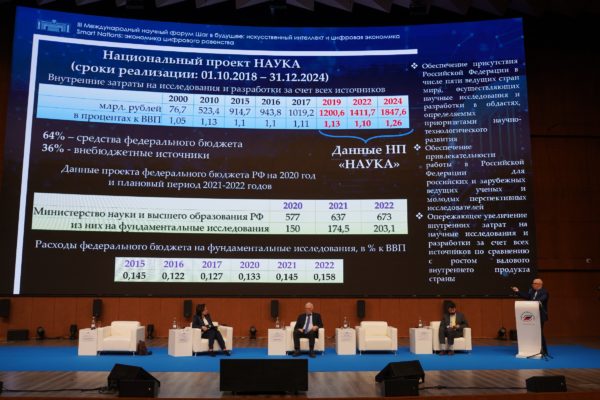
Key Barriers to Digital Equality Today. A Scientific Perspective
The scientific component of the digital economy phenomenon and its long-term consequences were discussed during the plenary session of the second part of the 3rd International Scientific Forum Stepping into the Future. Artificial Intelligence and Digital Economy.
In the context of this year’s general trend ‘Smart Nations. Economy of Digital Equality’, top Russian scientists and representatives from the Russian Academy of Sciences presented their views. The speakers included Vladimir Betelin, Professor, Doctor of Physical and Mathematical Sciences, Academician of the Russian Academy of Sciences, Head of the Scientific Research Institute for System Analysis of the Russian Academy of Sciences, and Albert Bakhtizin, Professor, Doctor of Economics, Corresponding Member of the Russian Academy of Sciences, Director of Central Economics and Mathematics Institute Russian Academy of Sciences. In their presentations, the researchers outlined the key barriers to digital equality in the world today and defined the foundations of a strategy to secure the sustainability of the state in a digital environment.
In his presentation ‘On the Beneficiaries of the Digital Equality Economy’, Academician Vladimir Betelin drew attention to the economic component of the digital phenomenon technology driver. He linked it to the purely economic interests primarily of the US semiconductor industry and the largest shareholders of the ICT Four, referred to as the ‘beneficiaries of progress in mass cheap digital technologies and such components of digital economy as big data and artificial intelligence’.
Pointing out the previous achievements of Russia’s contribution to the global information society, the speaker assessed them as 80%–100% import-dependent on computer and communication equipment, and 75%, on software. He emphasised the general reliance on services based on the information and telecommunication infrastructure of foreign manufacturers as well as the internet addiction of young people.
Vladimir Betelin believes that the development of an effective state mechanism to manage the implementation of high-tech production programmes in Russia is a feasible way to overcome this situation. In his opinion, the utmost focus should be on the quality and content of the Russian school and university science and information technology education.
Professor Albert Bakhtizin’s presentation ‘Mathematical and Computer Tools of the Digital Platform for Decision Support in the System of Distributed Situation Centres’ focused on the issues of ensuring effective functioning of high-tech decision-making centres in the system of federal and regional authorities. The particular focus of the presentation was on the agent-based model as a promising standard for analysis within distributed situational centres as well as the issue of building up agent-based model performance through the parallelisation of computations.
The Professor presented a wide range of tasks solved using the agent-based approach by Russian and foreign scientists, for example, within the BRICS Working Group on Information and Communication Technologies and High Performance Computing. Albert Bakhtizin spoke about the results of cooperation in the field of computer-based simulation with Lomonosov Moscow State University on the development of STARS-technology of agent-based model support for supercomputers. This technology makes it possible to achieve highly efficient model scaling.
The technology was applied in the implementation of a large-scale agent-based model of Eurasian countries, which simulates the main processes of population movement in these countries and their economies as well as the consequences of large infrastructure projects…,
noted the Professor,
The model was tested by Russian scientists on the Lomonosov supercomputer (Lomonosov Moscow State University) and jointly with specialists from Guangzhou National Supercomputer Centre (China) on one of the fastest supercomputers in the world, Milky Way-2.
Подпишись на тг-канал "Наш ГУУ" Дата публикации: 17.12.2019
Дата публикации: 17.12.2019







